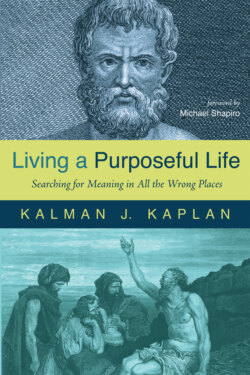Читать книгу Living a Purposeful Life - Kalman J. Kaplan - Страница 8
На сайте Литреса книга снята с продажи.
Preface
ОглавлениеI write this preface in April 2020 during the onset of the COVID 19 virus thought to have originated and reach epidemic proportions in Wuhan, the capital city of the Hubei province of China at the end of December, 2019. I think this frightening plague that has fallen on us makes this book especially relevant. As I was rummaging through my library, a book popped out that I had read, or at least skimmed, more than twenty years ago: Viruses, Plagues, and History, by Michael Oldstone, professor at that time at the Scripps Research Institute, where he directed the Laboratory of Viral Immunobiology. I vaguely remember skimming it and then putting it aside—I have picked it up again. It was prescient in its warnings.
I remember a number of great works of fiction and history built around the theme of a plague. Samuel Pepys’s diaries chronicle the Great Plague of London in 1665–66. Edgar Alan Poe’s The Mask of the Red Death depicts a plague in an unnamed city in fourteenth-century Europe. In The Decameron, Giovanni Bocaccio writes of a small group quarantined in Florence during the Black Death. Thomas Mann writes of a cholera plague in Venice in Death in Venice and Albert Camus’s The Plague tells of an unspecified plague in Oran in French Algiers. Gabriel Garcia Marquez writes of Love in a Time of Cholera in an unnamed port city near the Caribbean Sea, probably Cartagena. And of course Sophocles’ Oedipus Rex begins with a plague overwhelming the city of Thebes, as does the Passover (Pesach) Haggadah, recounting the plagues leading to the exodus of Israel from Egypt. And I am certain that there are many other works of fiction that involve a plague or a catastrophe of one sort or another, for example, the story of Noah and the great flood or of the destruction of Sodom and Gomorrah.
In an age where so many of us have rushed around obsessively in a search for meaning, to the point of threatening or even committing suicide or self-destructive acts, we realize suddenly that the choice of life and death is not always ours. As Immanuel Kant said, we are awoken from our “dogmatic slumber.” The choice of life and death is not ultimately ours, as much as we may try to take it into our own hands. In whose hands is it then? The Greek moira (fate)? Luck? Destiny? Or is our life and death in God’s hands, expressed through scientific and medical knowledge. These are weighty questions which suddenly have become immediate. As we will illustrate in chapter 4, Zeno the Stoic overinterprets, indeed catastrophizes, a minor mishap, that is, stubbing or perhaps wrenching his toe, as a sign from the gods that he should depart. The biblical Job has no need for such a destructive search for meaning. He has a purpose. To live his life simply. And to do what he can to live his life purposively in the face of great upheaval that has befallen him.
This is what we are all facing now that we are confronted with a calamity. Prior to this, we as a society have been behaving like Zeno, exaggerating slights, catastrophizing people’s utterances, and generally behaving like overindulged, shall we say spoiled, brats. We see now that the question of life and death is always what it has been, ultimately not in human control in any simple way. Our choice is how to respond to these assaults. Will we, like Zeno, be incapable of facing adversity, even minor inconveniences; or we will, like Job, fight the plague that has fallen on us with all our strength and all our might?
I pray (yes, pray) and hope that by the time this book comes into print, this assault on our lives will have lifted, and that we will have behaved like the biblical Job rather than like Zeno the Stoic. And that we will learn from this.
